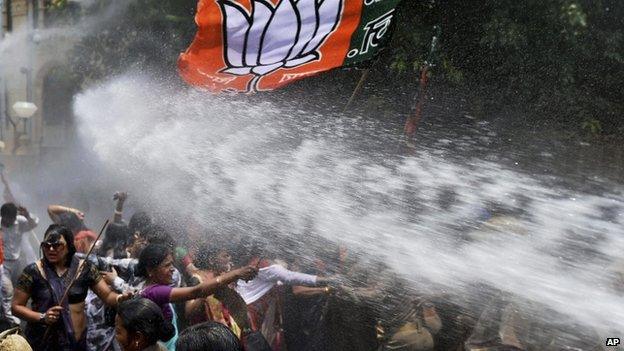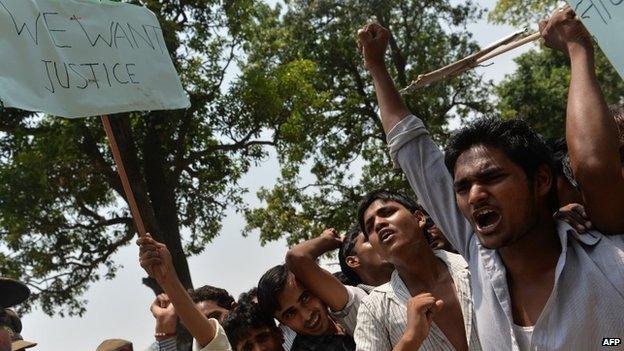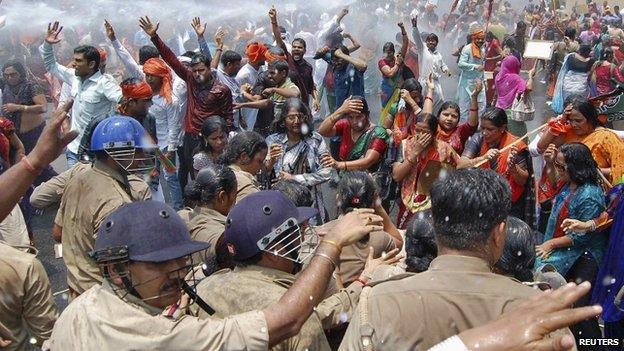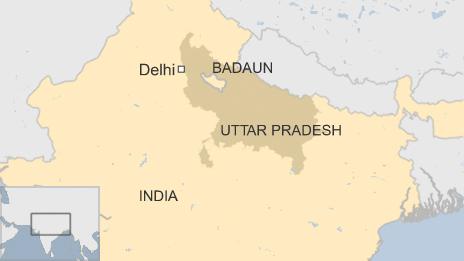India police fire water cannon at gang-rape protesters
- Published

Police held back against protesters outside the office of Uttar Pradesh's chief minister
Indian police have fired water cannons to disperse hundreds of protesters in Uttar Pradesh state where two teenage cousins were gang-raped and hanged.
The protesters, many of them women, were demonstrating outside the office of state chief minister Akhilesh Yadav.
Police have detained five people, including two policemen, in connection with the attacks.
Meanwhile, reports say another woman has been found dead after being gang-raped elsewhere in the state.
The body of the woman, thought to be 22, was discovered on Saturday in the Baheri area, the Press Trust of India reported quoting police sources.
A post mortem revealed she had been forced to drink acid before she was strangled.
The two teenage girls were found hanged from a tree in Badaun district last week. The victims' families say it took police more than 12 hours to respond to reports they were missing.

Police inaction over the incident has sparked outrage in Uttar Pradesh state

The demonstrators in Lucknow demanded an end to attacks on women
A federal police investigation has been ordered amid growing anger over the killings.
Police in the city of Lucknow used force and water cannons to keep back hundreds of protesters demanding that Mr Yadav put an end to violence against women in the state.
Mr Yadav's government has come under criticism for its lax approach towards women's safety,
"We're not going to sleep, we'll be here, they have to stop this [violence against women]," one protester told the NDTV news channel.
"We're going to stay here, we're not going to give up," one man said before the crowd was drenched by the police.
'Confessions'

Three suspected attackers have been held, along with two policemen accused of dereliction of duty and criminal conspiracy.
Indian media have quoted the local police as saying that two of the attackers have "confessed to their crime during interrogation", but this could not be independently confirmed.
The girls, thought to have been 14 and 15, went missing last Tuesday night. They had apparently gone out to relieve themselves as they had no toilet at home.
Their bodies were discovered the following day. A post-mortem examination confirmed multiple sexual assaults and death due to hanging.
Scrutiny of sexual violence in India has grown since the 2012 gang-rape and murder of a student on a Delhi bus.
The government tightened laws on sexual violence last year after widespread protests following the attack.
Fast-track courts were brought to the fore to deal with rape and the death penalty was also brought in for the most extreme cases.
Some women's groups argue that the low conviction rate for rape should be challenged with more effective policing rather than stiffer sentences.

Rape cases that have shocked India
23 January 2014: Thirteen men held in West Bengal in connection with the gang rape of a woman, allegedly on orders of village elders who objected to her relationship with a man
4 April 2014: A court sentences three men to hang for raping a 23-year-old photojournalist in Mumbai last year
15 January 2014: A Danish woman is allegedly gang raped after losing her way near her hotel in Delhi
17 September 2013 : Five youths held in Assam for allegedly gang-raping a 10-year-old girl
4 June 2013: A 30-year-old American woman gang-raped in Himachal Pradesh
30 April 2013: A five-year-old girl dies two weeks after being raped in Madhya Pradesh
16 December 2012: Student gang raped on Delhi bus, sparking nationwide protests and outrage; she later dies of her injuries
